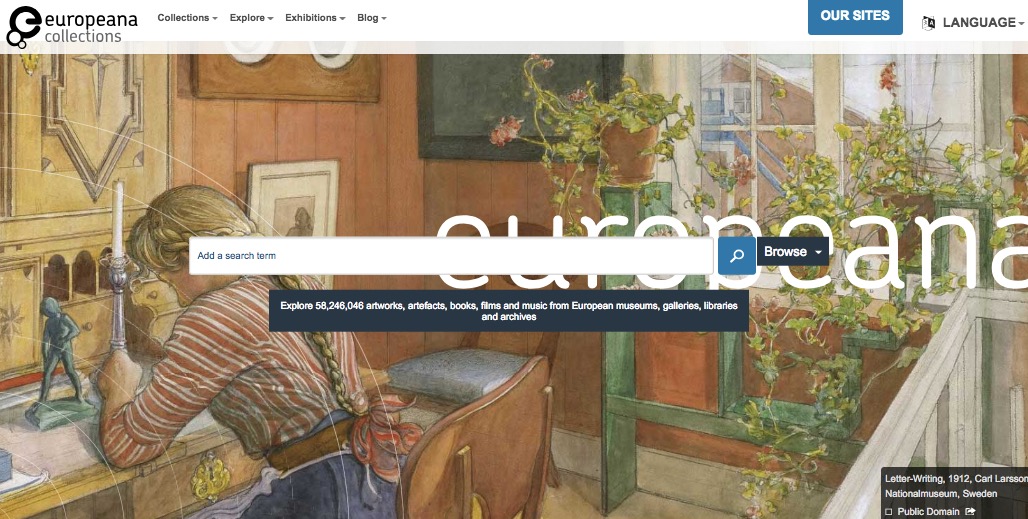Cultural Heritage: “Ten Years of Europeana: Bringing Europe’s Cultural Heritage Into The Digital Age” (Release of “On the Evaluation of Europeana and the Way Forward” Report)
From the European Commission:
The Europeana initiative has brought significant added value in supporting Europe’s digital cultural heritage but can still do more in terms of scope, focus and usability, according to a report adopted on 6 September by the European Commission.
[Clip]
The Europeana platform currently provides access to over 58 million cultural items from more than 3,700 libraries, archives, museums and collections. Its collections cover a variety of themes from art and fashion to photography and sport, reflecting European cultural history from pre-history to the present day.
The Commission’s report, based on an independent evaluation of Europeana, highlights its success in bringing Europe’s digitised cultural heritage to a pan-European audience, enabling European cultural institutions to collaborate and share their material online, through common standards and interoperability solutions, and developing a network of aggregators, cultural institutions and digital cultural heritage professionals from across the EU
But the evaluation also stressed that while Europeana had exceeded expectations in terms of the quantity, there was still some work to be done on quality. In particular both content (in terms of geographical scope, thematic coverage and cultural interest) and metadata (in terms of multilingualism, detail and inconsistencies) could be improved, while improving the technical infrastructure of the portal, its multilingual nature and the search and filtering facilities are also necessary.
New Proposals
Based on the evaluation, the Commission has made a number of proposals for the development of Europeana.
Looking to the future and beyond the 2018 European Year of Cultural Heritage, the initiative should focus primarily on the needs of primary stakeholders in the cultural heritage sector – in particular cultural heritage institutions – which the initiative should support and steer in their efforts to make cultural heritage accessible in the digital age. This will include upgrading the Europeana platform to improve accessibility of content, searchability and multilingualism, as well as making it easier for data providers and aggregators to use the service.
The Commission is also recommending that the content be curated (selected and organised according to themes) to showcase more effectively the breadth and depth of cultural heritage from Member States, with multilingual collections, exhibitions and virtual galleries, taking advantage of AI, language processing and big data to automate the process as much as possible. This will enable smart content to be created that can be re-used in other sectors such as the education, research or the creative sectors.
The platform should also continue to drive standardisation and common solutions within the digital cultural heritage sector, to the benefit of all stakeholders, in particular improving access for smaller cultural heritage institutions.
The Commission report further recommends continuing EU funding support for Europeana under the Connecting Europe Facility up to 2020. After this date, Europeana will be funded from the new Digital Europe programme proposed by the European Commission for the next Multiannual Financial Framework and currently being negotiated.
Direct to Full Text Report: “On the Evaluation of Europeana and the Way Forward”
10 pages; PDF. |||| HTML Version
Direct to Complete News Release
Filed under: Archives and Special Collections, Data Files, Funding, Libraries, News
About Gary Price
Gary Price (gprice@gmail.com) is a librarian, writer, consultant, and frequent conference speaker based in the Washington D.C. metro area. He earned his MLIS degree from Wayne State University in Detroit. Price has won several awards including the SLA Innovations in Technology Award and Alumnus of the Year from the Wayne St. University Library and Information Science Program. From 2006-2009 he was Director of Online Information Services at Ask.com.



